NEWS
- All Post
- NEWS
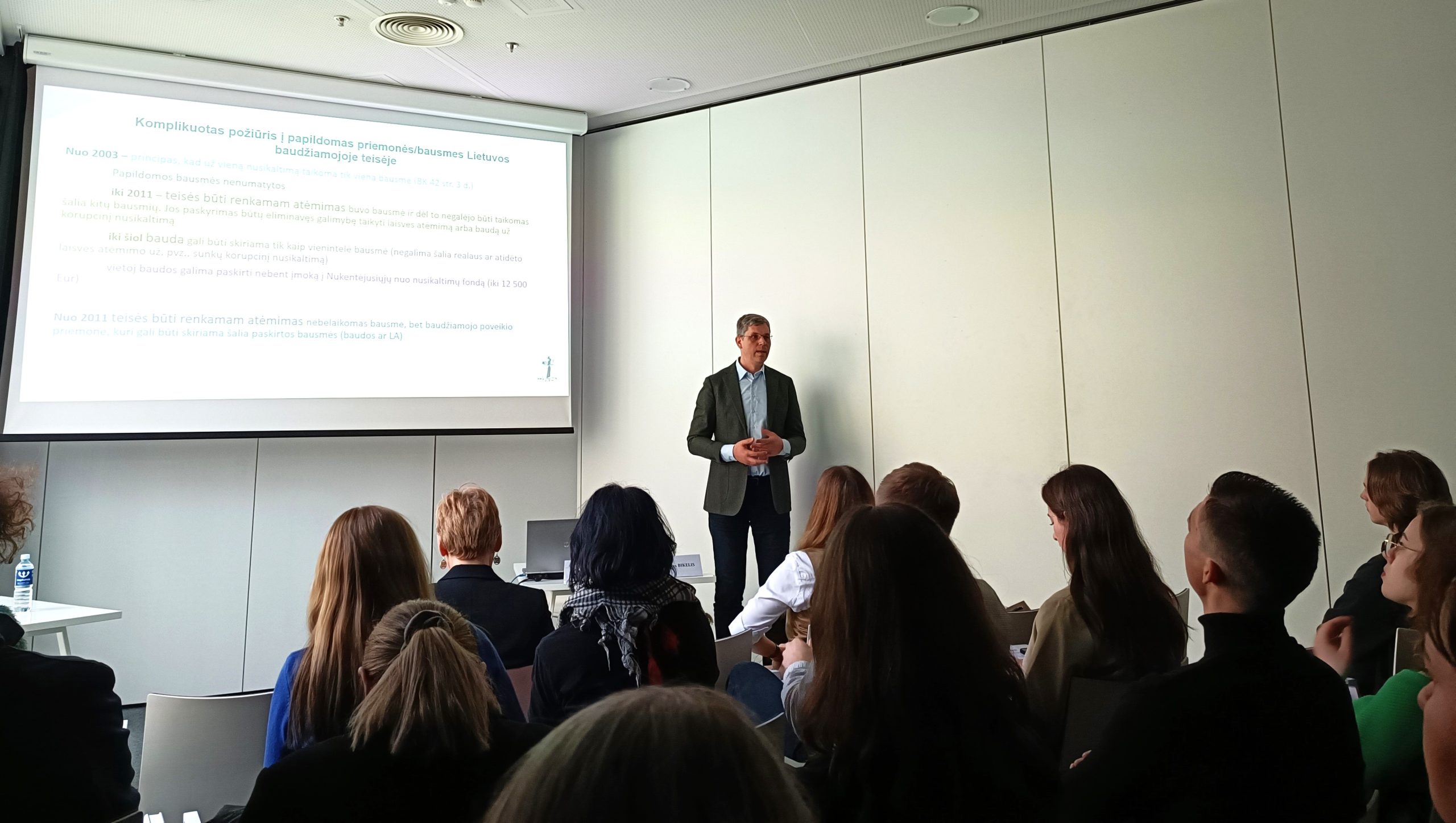
On 19th of April, 2024, the conference of the Lithuanian Association of Criminologists attracted a large number of participants with a wide range of presentations by researchers and practitioners in the fields of technology and criminology. This year, the organisers invited to discuss contemporary connections between criminology in science, practice and everyday life.
In one of the sessions “Corruption and Transparency in the Public Sector”, Skirmantas Bikelis, a researcher at the Law Institute of the Lithuanian Centre for Social Sciences (LCSS LI), shared his insights with the audience, which was barely able to fit in the room. In his presentation “When Those Convicted of Corruption Rule: The Dilemma Between the Prohibition on Running for Office and the Prohibition on Holding Office? Issues of Verbosity and Proportionality”, the researcher examined the controversial issues of regulation and application of the prohibition on holding public office and being elected, while comparing the regulation in Lithuania and Germany, where there are substantial differences.
Dr. Skirmantas Bikelis began his presentation by discussing the relevant provisions of the European Union Directive project draft on the fight against corruption. “If the project of Directive is adopted,” he said, “Lithuania will have to abandon the long-standing principle that only one punishment is applicable for a single offence, as the draft requires courts to be able to impose a range of additional measures (in addition to the main sanction), including fines, in relation to corruption offences.”
Discussing the relevant 2023 trials, in which problems have arisen with the application of the prohibition on being elected to public office, the researcher identifies the excessive wording in the Criminal Code as one of the main reasons for the strange decisions of Lithuanian courts. “The multi-wording and over-simplification of the text of the Penal Code, with casuistic descriptions of the procedural aspects of the deprivation of a right, opens the door to mistakes,” said Dr. Skirmantas Bikelis.
At the end of his presentation, the researcher drew attention to one of the most recent changes in the Electoral Code, which expanded the restrictions on the right to be elected, and highlighted the problematic nature of these changes from the point of view of the principle of proportionality. According to these amendments, individuals are automatically deprived of the right to participate actively in political life, even if a court does not impose a prohibition, but imposes any criminal measure (deprivation of driving privileges, deprivation of the right to fish, an obligation to compensate for property damage, etc.) for an offence that may not be in any way related to political activity, such as causing a traffic accident. The conflict with the principle of proportionality is particularly evident when comparing the Lithuanian regulation with the much more restrained and weighted approach of the German legislator.
Dr. Skirmantas Bikelis’ latest publications on the topic of the prohibition to hold public office:
- “Legal Stability in Lithuania: How Long Should a Mayor Convicted of Corruption Stay in Power?” (article written in Lithuanian).
- “Tubis or not Tubis - this is the Question for Our State of Law and Democracy” (article written in Lithuanian).
Dr. Skirmantas Bikelis is currently leading a project funded by the Lithuanian Research Council “Criminalization of Asset Legalization in the System of Criminal Profit Control Strategies“ (LEKOSTRA).
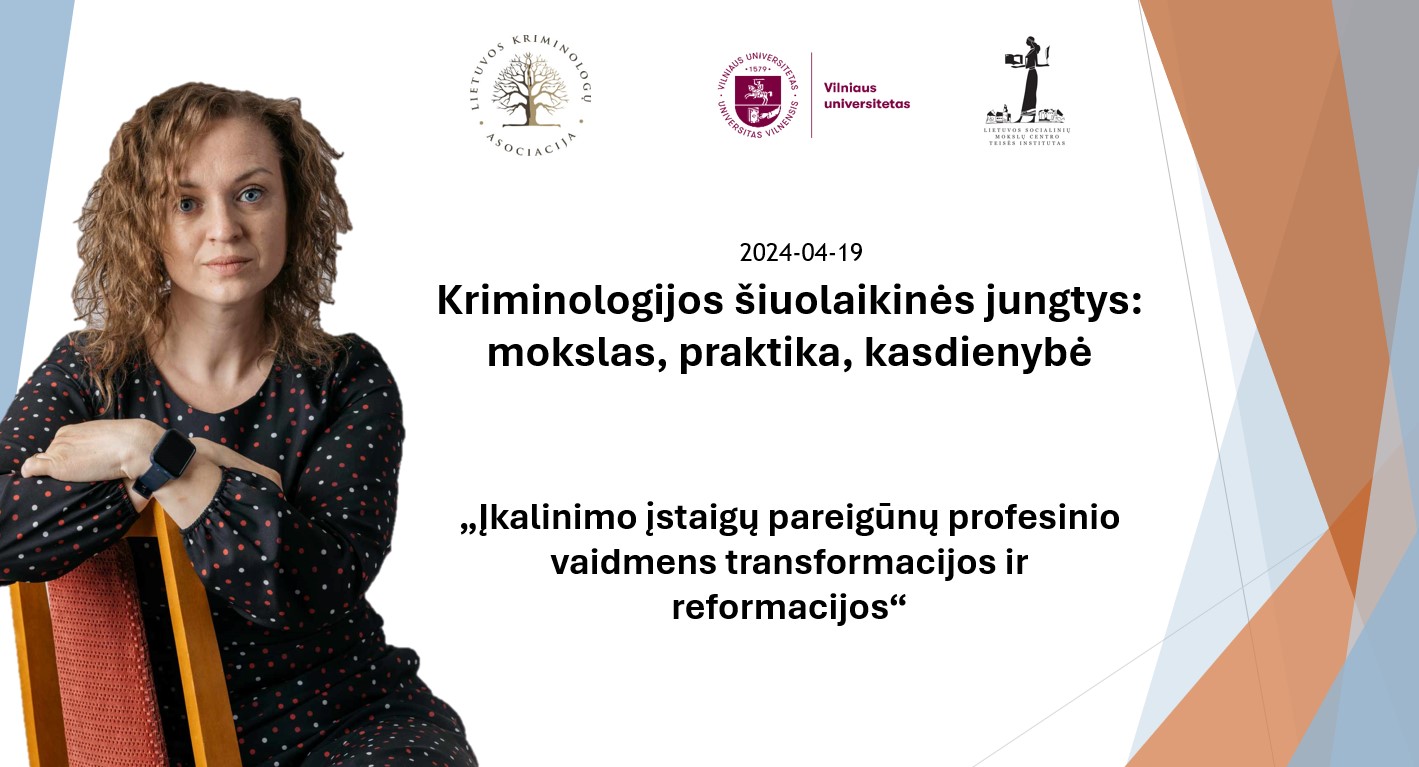
On April 19, 2024, the National Conference of the Lithuanian Criminologists’ Association “Contemporary Connections in Criminology: Science, Practice, Everyday Life” took place. The annual event was attended by scientists and practitioners from various fields, who aimed to reveal the role of technology in criminology and discuss about the perspectives and threats of technology in law enforcement.
At the conference, scientists from the Law Institute of the Lithuanian Centre for Social Sciences also presented their reports. Dr. Rūta Vaičiūnienė in her presentation “Transformations and Reformations of the Professional Role of Prison Officers” introduced and compared the prison models of Western and post-Soviet countries, highlighting the differences in the roles of prison officers.
Additionally, the researcher presented the latest data from the focus group discussion of the project “Changes in prison officers’ professional roles within the shifting custodial sentencing policy and practice” (PRISTA), funded by the Research Council of Lithuania. The findings revealed the daily life of prison officers: collaboration among colleagues, the implementation of resocialization goals, relationships between officers, and internal professional roles’ conflicts of prison staff.
After presentation, discussions with conference participants revolved around the assumptions of the final research results.
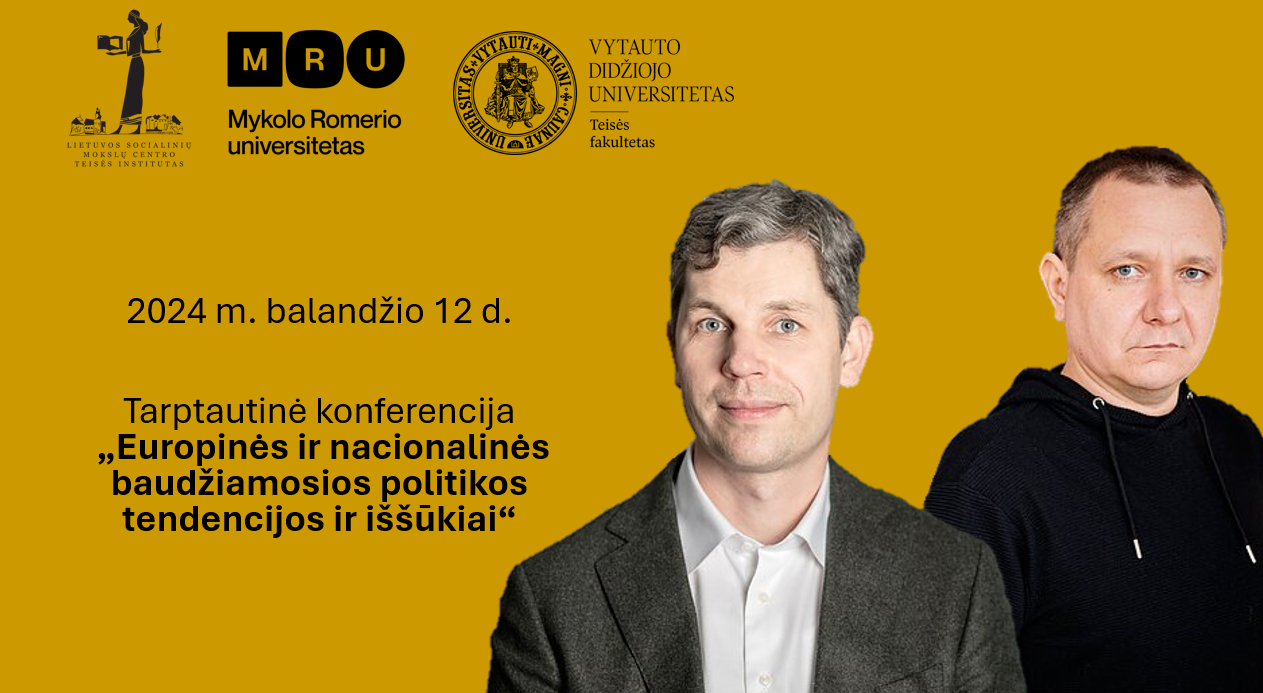
On April 12, 2024, the fourth international scientific-practical conference “Trends and Challenges in European and National Criminal Policy” organised by the Law Institute of the Lithuanian Centre for Social Sciences (LCSS LI), the Faculty of Law of Vytautas Magnus University, and the Law School of Mykolas Romeris University was held. At the event, along with Lithuanian and foreign researchers and practitioners, Dr. Mindaugas Lankauskas and Dr. Skirmantas Bikelis from LCSS LI also participated.
Mindaugas Lankauskas presented a topic “How Does Themis Weigh Drugs? Legal Framework for the Determination of Drug Quantities in Lithuania”. During his presentation, the researcher introduced criteria for determining the quantity of psychoactive substances and its impact on criminal liability.
“Why do the quantities of hashish and cannabis differ by up to 20 times according to our legislation?” - rhetorically asked Dr. Lankauskas, identifying problematic aspects of drug quantity determination. Finally, the researcher also presented his proposals on what should be done to ensure that the law regarding quantity does not abandon the principle of proportionality.
This topic was thoroughly examined in a recent article by Dr. Lankauskas titled “How does Themis Weigh Drugs? Peculiarities of the Legal Regulation of the Determination of Quantities of Some Narcotic and Psychotropic Substances in Lithuania” published in the scientific criminology journal “Criminological studies”, which is published by LCSS Law Institute in collaboration with the Lithuanian Criminologists’ Association and Vilnius University.
Skirmantas Bikelis presented a paper in English titled “Prohibition to Hold Public Office and Prohibition to Be Elected - Lithuanian v. German Approaches. Legal language and proportionality issue”. In his presentation, the researcher compared the regulation of Lithuania and Germany regarding an additional sanction - the prohibition to hold public office. At the end of his presentation, he identified linguistic aspects that could become reasons for failure when seeking to impose this additional punitive measure on the convicted individual.
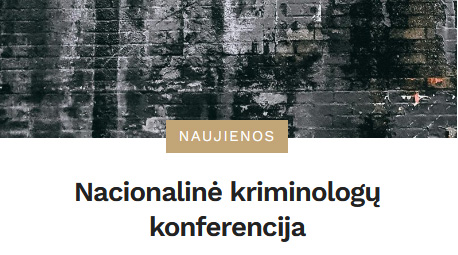
LCSS Institute of Law, the Lithuanian Association of Criminologists and the Faculty of Philosophy of Vilnius University invite you to the annual Lithuanian Criminologists' Conference "Contemporary Connections of Criminology: science, practice, everyday life". The conference is dedicated to discussing contemporary issues about the challenges and needs of digital technologies and innovations in the context of criminological science. The conference will focus on the role of rapid change, technology in crime control and the concept of punishment.
The scientific conference will feature presentations from a wide range of disciplines, which will delve into contemporary issues that arise in science, law enforcement and public sector institutions.
The date of the conference is 2024 m. balandžio 19 d. (penktadienis).
Konferencijos laikas: 9:00–17:00
Dalyvių registracija vietoje: 8:30 – 9:00
Participant registration form.
Conference venue - Vilnius University Science Communication and Information Centre, Saulėtekio al. 5, Vilnius.

We kindly invite you to the 4th Annual International Conference "Trends and Challenges in European and National Criminal Policy", which will be held on 12 April 2024, organised by the LCSS Institute of Law, the Faculty of Law of Vytautas Magnus University and the Law School of Mykolas Romeris University.
The conference will feature presentations by Polish and German scholars, researchers from the LCSS Institute of Law, Vytautas Magnus University Faculty of Law and Mykolas Romeris University School of Law. Practitioners and researchers will discuss various topics in the field of criminal law, present the results of the latest research and raise topical issues of criminal policy.
The date of the conference is Friday 12 April 2024.
Registration on site: 8:30 - 9:00
Conference: 9:00 - 14:10
Conference venue - Mykolas Romeris University, Ateities str. 20, Vilnius, Room 414.
Renginio programą rasite čia.
Participants who have registered and attended at the conference will be able to receive a certificate of attendance.
Photo by Jaoa Cruz (Unsplash).
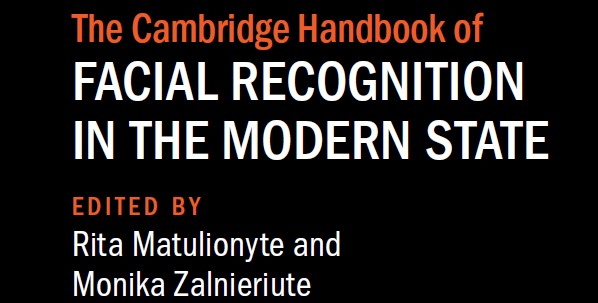
The internationally renowned Cambride University Press has published a collective book, coordinated by the Institute's researchers, which examines various aspects of the use of facial recognition technologies: The Cambridge Handbook of Facial Recognition in Modern State (eds. Monika Žalnieriūtė and Rita Matulionytė).
The book covers the legal, social and ethical aspects of facial recognition technologies in five regions of the world - Europe, North America, South America, Asia-Pacific and Africa.
Facial recognition technologies are widely used in institutions ranging from border control and police to social services. Automated facial recognition technologies are used by governments in various countries to collect taxes, prevent crime and control migration processes. Facial recognition technologies involve the processing of a person's facial image,usually for identification, categorisation, or counting. This book brings together contributions from experts in law, technology, communications, and social and political sciences to discuss how facial recognition technologies have been developed and used by local authorities, and how they are regulated in different jurisdictions across five continents.
The book consists of 19 chapters written by 34 contributors from around the world, including Institute of Law researchers Rita Matulionytė, Agnė Limantė, Egle Kavoliūnaitė-Ragauskienė and Monika Žalnieriūtė.
This book is the result of the project „Government Use of Facial Recognition Technologies: Legal Challenges and Solutions (Face-AI)“. The project was funded by the Lithuanian Research Council (Contract No. S-MIP-21-38).
The book is available here.

LCSS Institute of Law is changing its address and moving to new premises. From now on you can find us at A. Goštauto str. 12, Vilnius!

Dr Agnė Limantė, Chief Researcher at the Legal System Research Department of the Law Institute of the LCSS, became a member of the International Advisory Board of the scientific journal Collected Papers of the Faculty of Law of the University of Rijeka. Congratulations to our colleague!

„The international Journal of Human Rights“ has published an article by Dr. Agne Limante, a researcher at the Institute, called „Protecting vulnerable groups in Europe: highlights from recent case law of the European Court of Human Rights“.
The article focuses on recent cases of the European Court of Human Rights (ECtHR) where the Court has granted legal protection to vulnerable groups. It examines the paradigm of vulnerability in the context of the ECtHR cases and the case law in order to identify recent trends and developments in the Court's decisions.
Agnė Limantė's publication can be found here.

